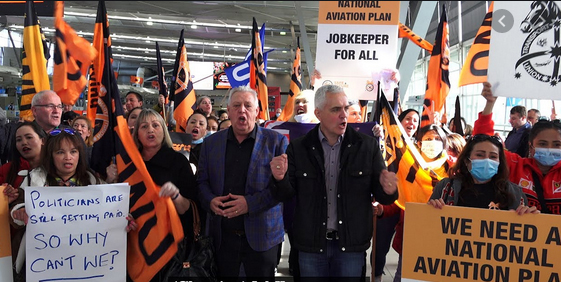1.1 million workers in Australia will have their ‘JobKeeper’ payments removed from this week, with the Head of Treasury estimating that between 100,000 and 150,000 workers face the sack as a result of the programme ending.
Of the remaining million workers, hundreds of thousands are likely to lose hours, shifts and pay.
Data showing the scale of the sackings will not be publicly available until after the federal budget is delivered in May.
‘JobKeeper’ is the Australian equivalent of the UK’s ‘furlough’ scheme.
Many are still heavily reliant on JobKeeper, including aviation, higher education, arts, parts of manufacturing and retail.
Local economies that are reliant on tourism will be disproportionately affected by the ending of JobKeeper and face an uncertain future without ongoing support.
ACTU (Australian Council of Trade Unions) President Michele O’Neil said on Sunday: ‘1.1 million workers face an uncertain future without the JobKeeper wage subsidy, which has prevented catastrophic job losses during the pandemic and is now being ripped away.
‘Up to 150,000 people are facing losing their job this week because of the actions of the conservative Scott Morrison government.
‘Hundreds of thousands more will lose shifts or hours.
‘Cutting off JobKeeper while so many workers are still reliant on it is both cruel and counter-productive to our economic recovery.
‘We need money in the hands of working people so they can spend it.
‘This will not only hurt working people but also small businesses many of which are still struggling to recover.
‘Women are over-represented in the industries most reliant on JobKeeper and will be disproportionately impacted by this cut.
‘While some sectors of the economy have returned to work, there are many regions that rely on tourism where the recovery has barely started. Cutting JobKeeper will be devastating to regional Australia.
‘What working people need more than ever is security and stability. JobKeeper with strict criteria ensuring it reaches only businesses genuinely in need will save jobs and should not be removed until all sectors of the economy have recovered.’
Meanwhile, Australian unions are calling for a 3.5 per cent increase to the minimum wage for millions of workers.
The ACTU has put in a claim which would push the minimum rate to $20.53 an hour.
Secretary McManus said: ‘The increase is necessary, following last year’s increase of just 1.75 per cent, which was delayed for most workers.
‘That increase had meant Australia had fallen behind the UK and New Zealand in establishing a living wage, defined as 60 per cent of the median income, and even the US is catching up.
‘If wages don’t increase, it threatens the entire recovery.
‘Money in the hands of working people is what will create sustainable economic growth, not bigger profits for big business.
‘If it is a V-shaped recovery for profits, it needs to be for wages as well.
‘Profits have risen 8.9 per cent through 2020 yet labour’s share of income is at historical lows.’
The ACTU’s wage claim – which equates to a $26.38 a week increase for a full-time minimum-wage worker – is less than its four per cent claim last year.
Retailers did not have to pay last year’s increase until February 1st because of the government commission’s decision to delay the wage rise.
- Deliveroo riders in Sydney will join an international strike over pay and rights as the company prepares to begin selling stocks on the London exchange on Wednesday 7th April.
The UK company’s initial public offering has been predicted as one of the biggest stock market flotations in London in a decade.
But riders in Australia and elsewhere complain they can barely get by on the pay offered by the company, and many are shaken by a recent spate of deadly injuries suffered by colleagues on the job.
Transport Workers Union (TWU) assistant national secretary Nick McIntosh described the company’s business model as ‘built on exploitation, refusal of rights and wage theft’.
‘Food delivery riders protesting in Sydney today are mourning the loss of five riders killed last year. They’re fighting poverty pay, unfair sackings and pressure to work quickly and dangerously without protective gear,’ he said.
When companies want to offer shares on the stock market, they must first disclose a long list of information, including what risks there could be for investors, in a document called a prospectus.
Deliveroo’s prospectus included 24 pages of risk factors, such as government investigations or challenges against the working conditions for delivery riders in Australia, the Netherlands, Spain, Belgium, France and Italy.
It mentions an Italian probe that found riders should be entitled to the same benefits as employees, meaning the company could be forced to pay back the riders’ minimum wage, paid holidays, paid sick leave and severance entitlements for the years between their launch in the country in 2015 until 2020. Deliveroo has appealed that ruling.
The prospectus acknowledges that Deliveroo’s business could suffer by riders stopping work, saying such actions might ‘require us to adopt or negotiate changes with respect to working arrangements that are unfavourable to the business’.
Some large potential investors have already been scared off, including the investment funds Aberdeen Standard and Aviva Investors, both of which cited Deliveroo’s social policies in their decisions to pull out, Agence France Presse reported.
A TWU survey of 100 Deliveroo riders showed almost all respondents had experienced pay decreases, and 89 per cent said they struggled to pay bills and buy groceries.
Nearly half of respondents said they’d been injured at work, and 78 per cent said they worried about being seriously injured or killed on the job.
Last year, there were several incidents where riders from various companies died while making deliveries.
